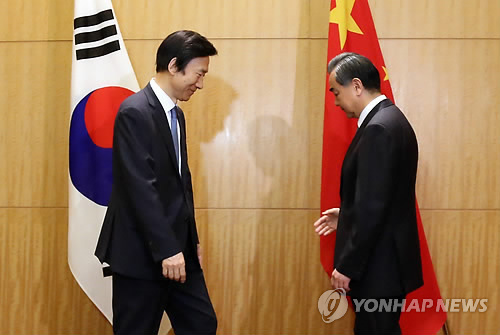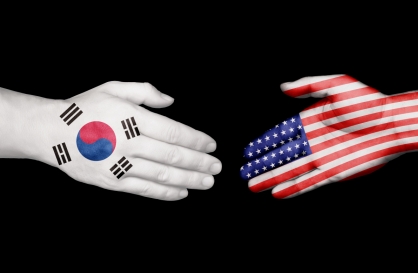Concerns grow over scandal’s impact on foreign policy initiatives
By Shin Hyon-heePublished : Oct. 31, 2016 - 16:59
With the Choi Soon-sil scandal taking a toll on President Park Geun-hye, concerns are rising over possible repercussions on Seoul’s diplomatic and security initiatives, such as a trilateral summit with China and Japan, a US missile shield deployment and an intelligence-sharing pact with Tokyo.
The US, China, Japan and other key diplomatic partners are closely monitoring the development of the scandal involving Park’s confidante Choi, which has virtually placed state affairs at a standstill, diplomats say.
The US, China, Japan and other key diplomatic partners are closely monitoring the development of the scandal involving Park’s confidante Choi, which has virtually placed state affairs at a standstill, diplomats say.

Most day-to-day diplomatic activities remain business as usual at home and overseas. But major projects, especially those requiring top-level decision-making, are feared to have hit a snag as Park loses her grip, and in particular if a neutral Cabinet is created in line with the ruling party’s demands.
To prevent a potential vacuum, Foreign Minister Yun Byung-se instructed senior ministry officials to carry out diplomatic and security undertakings “in an unwavering manner” at a meeting on Monday, saying the issues should not be relevant to the ongoing furor in their nature, one participant said.
Despite Choi’s suspected meddling in presidential records including Park’s signature speech in Dresden, Germany in March 2014, the ministry assesses that so far no official document has been leaked directly, though it regularly sends papers to Cheong Wa Dae, the official noted.
Among the most pressing tasks at hand is a three-way summit with Chinese Premier Li Keqiang and Japanese Prime Minister Shinzo Abe, initially planned for late this year in Tokyo.
Last year, Seoul managed to revive the initiative by playing interlocutor between its two neighbors at odds over territorial brawls, arranging their first summit in more than three years.
As this year’s host, Japan is believed to have suggested late November or early December for the new gathering, but the sides have since made little progress on the date and other details.
Foreign Ministry officials here are currently exploring various scenarios for the meeting, including a dispatch of the prime minister on behalf of the president, sources said.
“Aside from tension between China and Japan, the Chinese side tends to confirm its leaders’ schedule at the final stage, sometimes as late as a couple of days before the proposed date,” a ministry official said, wishing to remain anonymous due to the sensitivity of the matter.
“Nothing has been decided at this moment, but there was a precedent of the prime minister attending the three-way summit when it took place on the sidelines of an ASEAN conference a few years ago.”
The scandal came at a delicate time, as the Park administration is pushing to station the US’ Terminal High Altitude Area Defense anti-missile system here, despite opposition from Beijing and Russia.
Last week, Seoul’s Defense Ministry also announced it would reopen talks with Tokyo for an accord designed to facilitate the sharing of intelligence on North Korea, which was shelved at the last minute in 2012 in the face of public and political backlash.
“Plans for the THAAD deployment and intelligence-sharing agreement are things we intend to complete within this government, so our worry is if they will lose momentum,” another ministry official said.
Adding to the concerns are North Korea’s evolving nuclear and missile threats, magnified by two underground detonations, an intercontinental ballistic missile test and other short- and mid-range rocket launches this year.
Speculation is rampant the communist state may press ahead with another large-scale provocation to coincide with the US presidential election slated for Nov. 8. The regime has staged nuclear or missile tests to coincide with its own national anniversaries and holidays as well as major US political events.
“With such a possibility in mind, we maintain the necessary readiness posture,” Joint Chiefs of Staff spokesperson Col. Jeon Ha-kyu told a regular news briefing, referring to the US vote.
Cheong Wa Dae spokesperson Jeong Yeon-kuk said, “The government will sustain solid readiness posture at any time given that national security is an issue that has no room for any crack at a time of North Korea’s escalating nuclear and missile threats.”
By Shin Hyon-hee (heeshin@heraldcorp.com)
To prevent a potential vacuum, Foreign Minister Yun Byung-se instructed senior ministry officials to carry out diplomatic and security undertakings “in an unwavering manner” at a meeting on Monday, saying the issues should not be relevant to the ongoing furor in their nature, one participant said.
Despite Choi’s suspected meddling in presidential records including Park’s signature speech in Dresden, Germany in March 2014, the ministry assesses that so far no official document has been leaked directly, though it regularly sends papers to Cheong Wa Dae, the official noted.
Among the most pressing tasks at hand is a three-way summit with Chinese Premier Li Keqiang and Japanese Prime Minister Shinzo Abe, initially planned for late this year in Tokyo.
Last year, Seoul managed to revive the initiative by playing interlocutor between its two neighbors at odds over territorial brawls, arranging their first summit in more than three years.
As this year’s host, Japan is believed to have suggested late November or early December for the new gathering, but the sides have since made little progress on the date and other details.
Foreign Ministry officials here are currently exploring various scenarios for the meeting, including a dispatch of the prime minister on behalf of the president, sources said.
“Aside from tension between China and Japan, the Chinese side tends to confirm its leaders’ schedule at the final stage, sometimes as late as a couple of days before the proposed date,” a ministry official said, wishing to remain anonymous due to the sensitivity of the matter.
“Nothing has been decided at this moment, but there was a precedent of the prime minister attending the three-way summit when it took place on the sidelines of an ASEAN conference a few years ago.”
The scandal came at a delicate time, as the Park administration is pushing to station the US’ Terminal High Altitude Area Defense anti-missile system here, despite opposition from Beijing and Russia.
Last week, Seoul’s Defense Ministry also announced it would reopen talks with Tokyo for an accord designed to facilitate the sharing of intelligence on North Korea, which was shelved at the last minute in 2012 in the face of public and political backlash.
“Plans for the THAAD deployment and intelligence-sharing agreement are things we intend to complete within this government, so our worry is if they will lose momentum,” another ministry official said.
Adding to the concerns are North Korea’s evolving nuclear and missile threats, magnified by two underground detonations, an intercontinental ballistic missile test and other short- and mid-range rocket launches this year.
Speculation is rampant the communist state may press ahead with another large-scale provocation to coincide with the US presidential election slated for Nov. 8. The regime has staged nuclear or missile tests to coincide with its own national anniversaries and holidays as well as major US political events.
“With such a possibility in mind, we maintain the necessary readiness posture,” Joint Chiefs of Staff spokesperson Col. Jeon Ha-kyu told a regular news briefing, referring to the US vote.
Cheong Wa Dae spokesperson Jeong Yeon-kuk said, “The government will sustain solid readiness posture at any time given that national security is an issue that has no room for any crack at a time of North Korea’s escalating nuclear and missile threats.”
By Shin Hyon-hee (heeshin@heraldcorp.com)



![[AtoZ into Korean mind] Humor in Korea: Navigating the line between what's funny and not](http://res.heraldm.com/phpwas/restmb_idxmake.php?idx=644&simg=/content/image/2024/04/22/20240422050642_0.jpg&u=)


![[Herald Interview] Why Toss invited hackers to penetrate its system](http://res.heraldm.com/phpwas/restmb_idxmake.php?idx=644&simg=/content/image/2024/04/22/20240422050569_0.jpg&u=20240422150649)
![[Graphic News] 77% of young Koreans still financially dependent](http://res.heraldm.com/phpwas/restmb_idxmake.php?idx=644&simg=/content/image/2024/04/22/20240422050762_0.gif&u=)







![[Exclusive] Korean military to ban iPhones over security issues](http://res.heraldm.com/phpwas/restmb_idxmake.php?idx=652&simg=/content/image/2024/04/23/20240423050599_0.jpg&u=20240423171347)



![[Today’s K-pop] Ateez confirms US tour details](http://res.heraldm.com/phpwas/restmb_idxmake.php?idx=642&simg=/content/image/2024/04/23/20240423050700_0.jpg&u=)